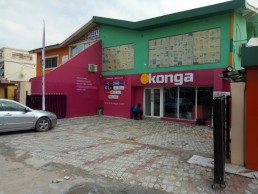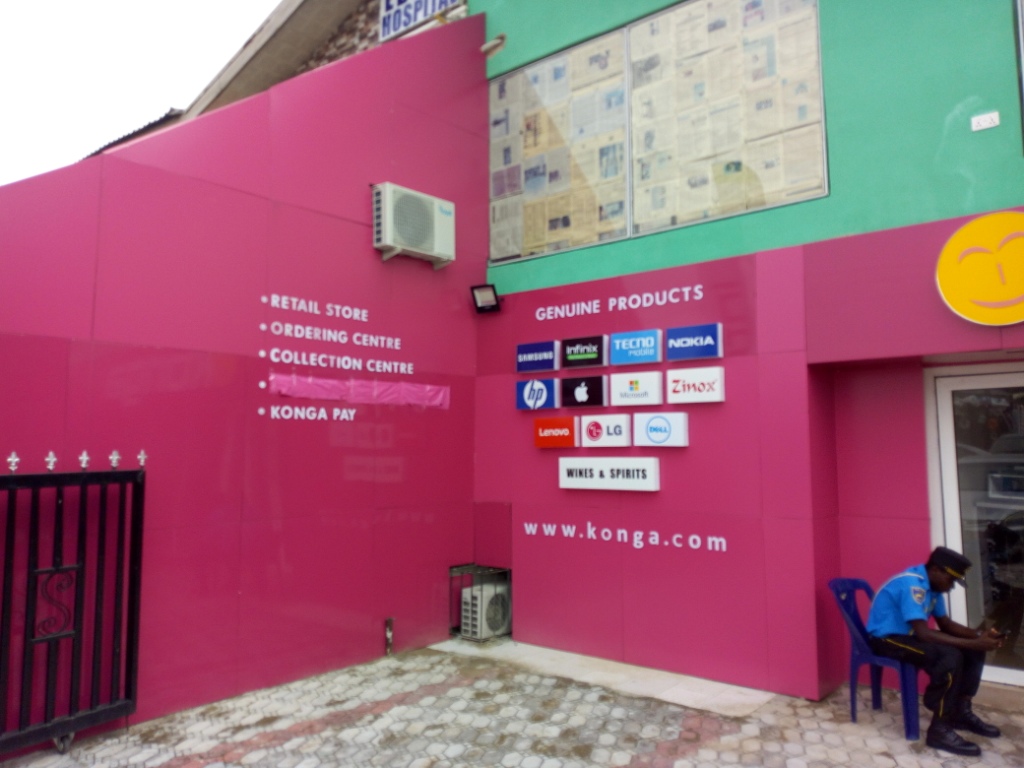INSIGHT
Why KONGA’s New Strategy Might Work.
By Century Favour | September 24, 2018

A while ago while heading to a cool evening dinner, I happened upon a standard-sized KONGA offline store with a regular storefront inscription like any other retail store’s. This seemed novel to me and many who are familiar with the old KONGA e-commerce business model can attest to that. Most Nigerians who have noticed the new Konga offline stores, either in a suburb or commercial district are likely to do a double-take for two reasons:
- the fact that the store is so conspicuously positioned and fully stocked with cutting-edge products for sale as is any other retail shop.
- the colour of the brand. The resplendent pink brand colour of the new KONGA is a polar opposite of it’s classic blue and this is sure to raise a couple of eyebrows.
I’d like to note here that I pride myself as being a tech enthusiast so even though, I was rooting enthusiastically for Konga’s platform and buying a few things online, most times I made purchases predominantly in offline traditional stores for the following reasons:
- the fact that most products require about a 5-7 working day delivery window and on occasions where I needed the commodity immediately, Konga wasn’t a top choice.
- Buying is often impulsive, so I felt there was a demerit of the long delivery window in the sense that when the product comes, you may have changed your mind as to if you really need it, or might have secured an alternative, or the money at hand to pay for the product may not be within reach because some other priority may have come up.
So, in spite of my tech inclination, my default buying pattern was more regularly offline.
In light of this, when I saw the physical Konga store for the first time, one thought that struck was the fact that this new strategy was going to be a winning strategy in the long term.
The Backstory
But first, let’s look at the Konga story. What is Konga and what were they about?
Konga is a Nigerian e-commerce company founded in 2012 by Sim Shagaya. Ranked as the largest online mall in Nigeria, it was created to offer a gamut of products ranging from electronic devices to household wares, clothing, computers and mobile phones, beauty products etc, purchased at the buyer’s convenience.
If you go back in time, Konga’s overarching vision was to be an engine that powers Africa’s commerce. I remember learning this from a Channels interview the founder once gave. Sim wanted Konga to be a platform that powered Africa’s commerce and he did a remarkable job of pursuing that vision. Working with the best developers and minds, KONGA built KongaPay, a remarkably strong and secure CBN-licensed payment platform, it built a solid delivery and logistics system; KOS-Express, it had one of the largest catalogues of products with large warehouses located in major cities across the country and it invested largely in marketing, trying to create awareness via traditional and new media outlets. Virtually, almost every Nigerian in one way or the other has heard about Konga.
Konga’s process was simple; you visit the website, place an order for a product, make your payment and it is delivered to you. The team’s novel strategy made e-commerce easy and convenient with you receiving your purchases at your doorstep, without you leaving your home. In no time, KONGA evolved into an online marketplace hub where the products of other merchants were hosted and it began facilitating the buyer-seller relationship between the merchants and consumers.
With its newly expanded market base, Konga encountered an interesting consumer behaviour challenge: most Nigerians were wary of online services and didn’t trust paying for products they couldn’t see. Also, they had to deal with the hassle of making complaints and seeking a refund if something went wrong. All these birthed their payment on delivery (POD) option and with this innovation in place, it invariably seemed like KONGA was becoming the engine that will power e-commerce across Africa.
In early 2018, shock swept across the tech industry when the news of the sale of Konga to Zinox went public. Although it was a sad day for me because of my belief in their potential, it raised a couple of observations in my mind.
“At the point where Konga seemed to be going through a trying phase and eventually an acquisition by Zinox, it seemed like physical superstores like Shoprite, Next Cash ‘n’ Carry were becoming more viable, with new ones like Miniso Nigeria coming up. “
The Sociology Of Buying; Traditional & Modern Consumers
In trying to understand this surprising development, I got to thinking and I observed that, just like Zinox’s e-commerce platform, BuyRightAfrica.Com which was launched over 12 years ago didn’t perform so well owing to the absence of credit cards and an e-payment infrastructure, the market was not yet ready for Konga’s revolutionary idea in spite of their strong product and value proposition.
According to the Euromonitor-reports-on-nigeria-retail-market article published on Abbakin.com website, despite the economic recession the country experienced, at the end of their financial year in July 2017, Shoprite recorded a rise in profit with a 48.2% increase in sales and a 38.2% increase in customer base. In addition, Nigeria and Angola were key markets outside of South Africa reported to have contributed to the group’s full-year earnings pegged at N3.86 trillion. This was also reported by the Businessdayonline.com website. Miniso Nigeria, a Japanese multinational lifestyle designer retail chain, with over 2,250 stores in 41 countries launched six stores in Nigeria in September 2017.
From an end user perspective, I realised that there were several factors preventing this remarkable commerce strategy from gaining traction.
According to the April edition of The Communicator, an online publication of The Nigerian Communications Commission, the number of internet users in Nigeria is about 98.3 million. For a country with an estimated population of over 190 million, that amounts to about 47% internet users in total, pointing to the fact that there are more people offline than online and so the default buying culture is offline. As at December 31st, 2017, the number of Facebook subscribers in Nigeria was pegged at 17million according to the Internet World Stats Website. Between then and May 23rd, 2018, an article on Techpoint.africa reported that Facebook’s Developer Programme Manager, Chukwuemeka Afigbo stated that about 26 million Nigerians are now active on Facebook. Although the increase in internet subscribers is encouraging, it’s still a far cry from the prevalent population realities of the country.
This explains why superstores like Shoprite, Ebeano and even the typical Igbo man’s shop in Alaba market and several other markets are gaining traction and expanding.
So a major element of our buying culture as Nigerians is trust, and so, even though technology is powerful, Cash and Carry is still king. I see a product, I like it, pay and take it home. No stories, no extended delivery window. If it’s faulty, it can be fixed right there or another, given in exchange.
There is a major issue of trust embedded in the average Nigerian’s psyche. Trust is a significant factor that influences a brand’s acceptance and as such, crucial for business transactions. The absence or presence of trust contributes to consumer confidence in the medium of purchase.
In addition, the demography of internet users, tech-savvy individuals and their purchasing predilections are also influential factors.
First, online malls may only be attractive to the younger age bracket whose disposable income can easily be channelled to online shopping because their expenditure is limited and they don’t have the added responsibilities of children and dependants that those in the older age bracket do.
Secondly, individuals within the age bracket of 25-34 are typically young, working-class professionals and although they are tech-savvy and inclined to online shopping, they are located within the low-middle income bracket which in turn, affects their disposable income level in comparison to the disposable income of those individuals within the age bracket of 34-50 who may be tech-savvy but have years of offline buying behaviour ingrained in them and so prefer to buy from that friend that sells London wears brought from their Dubai trip or Turkey wears.
On the flip side, some of the individuals in this older age-bracket haven’t gained a strong grasp of technology and internet usage yet, they don’t make up the tech user demography. Most of them are only just beginning to appreciate WhatsApp, so this affected the adoption of the Konga product. These are prevalent realities.
The New: Foresight For Best Practice in E-Commerce

Now, looking at Konga’s new strategy which involves the combination of their strong online presence in addition to an investment in physical, offline convenience stores, I think that this acquisition of Konga by Zinox, now turned merger between Konga and Yudala, the e-commerce brainchild of Zinox will be more viable in the long run.
Why? What this new strategy does is that it creates a strong brand trust for the consumer.
“The concern of brand trust is addressed in that people feel like that they can visit the online store, check out the prices and walk into the offline store close to them to make purchases directly, for the same price. This gives room for a new kind of experience that puts into context where Nigerians are and where they should be. “
What this portends for the entrepreneur or innovator in the Nigerian business or tech space is that as an entrepreneur looking to revolutionise and disrupt the market, it is paramount that your business framework caters to the prevalent cultural realities of your target market, putting in context their unique peculiarities. In essence, introduce the unfamiliar with the familiar.
Strategic Hindsight
Imagine if Konga had started with physical franchises strategically positioned across the country while building their strong online presence, it would have formed the formidable conglomerate of a SHOPRITE-like and Amazon-like venture. It would inevitably get to the point where people would no longer visit the physical stores and would be comfortable making purchases online because they know they can easily walk into a physical store in the event of a defective product as opposed to waiting for a long-drawn-out response from a customer care rep. you can’t see physically. thus increasing the value of the Konga product.
Lessons For The E-Commerce Space
In light of this, I think entrepreneurs can learn from how this affects the dynamics of businesses in Nigeria. Whilst we are leveraging the power of technology to disrupt and cause change and advancement in any industry, whilst we advocate the merits of digital marketing and technology it is important to understand that Nigeria is still largely an offline powered economy, with limited internet usage. As such, whatever strategy you are building should factor into the question of how to reach the unreached, how to reach those who don’t use the internet or aren’t tech savvy.
Secondly, your strategy should take into the consideration the socio-cultural factors that affect buying or consumer behaviour and at every step of the way, your strategy is designed to consistently inspire trust in the buyer’s mind. It goes beyond you knowing this internally as a brand, you have to intentionally ensure that your strategy makes it very easy for your customer base to hold you accountable.
In addition, your strategy should address the challenge of instant gratification that is characteristic of most Nigerians; I want the product now, I buy it now, I get it now without waiting for too long a delivery period to access value.
In the end, in trying to create something new or pioneering a shift, its okay to begin with the normal.
For example, when Facebook began, it was pretty boring, just one page. Imagine if all the exciting features that Facebook currently has were introduced from the onset, most users would have found the experience daunting or wouldn’t have been engaged.
Sometimes starting old school and innovating your way up may be a viable strategy.
What do you think?

About the Author
Century Favour is an Entrepreneur, Strategy, Technology, Marketing and Creative professional passionate about driving economic & social impact. Through his ventures (Endgame The Strategy Company, Do take action & centuryfavour.com) he works to ensure that People, Businesses, Governments & Non-Profits grow, succeed, achieve their strategic objectives, drive sustainable development and positively shape the future of the people & communities they serve.

About the Author
Century Favour is an Entrepreneur, Strategy, Technology, Marketing and Creative professional passionate about driving economic & social impact. Through his ventures (Endgame The Strategy Company, Do take action & centuryfavour.com) he works to ensure that People, Businesses, Governments & Non-Profits grow, succeed, achieve their strategic objectives, drive sustainable development and positively shape the future of the people & communities they serve.